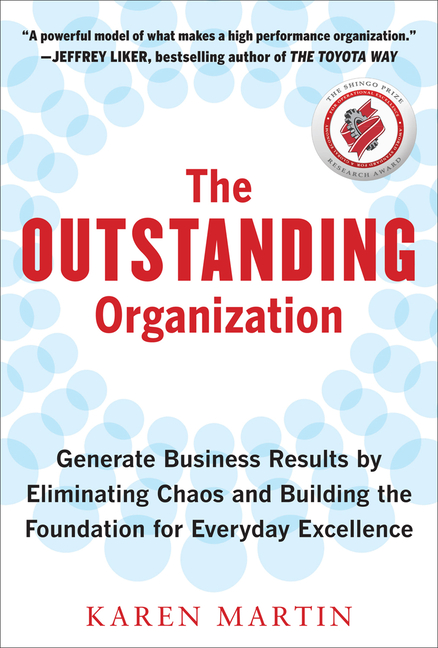The Outstanding Organization
November 05, 2012
A couple weeks ago I read and reviewed Bob Pozen's Extreme Productivity, which turned my attention to some excellent concepts and strategies for streamlining day-to-day operations. It's important to give attention to the more pragmatic side of operational improvement, an area in which Pozen has demonstrated excellence. I picked up this idea of improvement at a point where Extreme Productivity leaves off, with a consideration of something author and consultant Karen Martin discusses in her recent book, The Outstanding Organization.
 A couple weeks ago I read and reviewed Bob Pozen's Extreme Productivity, which turned my attention to some excellent concepts and strategies for streamlining day-to-day operations. It's important to give attention to the more pragmatic side of operational improvement, an area in which Pozen has demonstrated excellence. I picked up this idea of improvement at a point where Extreme Productivity leaves off, with a consideration of something author and consultant Karen Martin discusses in her recent book, The Outstanding Organization. While the key to personal efficiency and excellence exists inside a certain circle of behavior that we control on a personal level, we should also be concerned with the benefit that self-improvement has on our work and the organizations inside of which we're working. So it's a natural step out into this broader idea for improvement that spans not just one person's day-to-day habits, but a fundamental philosophy that provides the foundation for every organization.
Martin's argument springs from a diagnosis she makes early in the book:
A couple weeks ago I read and reviewed Bob Pozen's Extreme Productivity, which turned my attention to some excellent concepts and strategies for streamlining day-to-day operations. It's important to give attention to the more pragmatic side of operational improvement, an area in which Pozen has demonstrated excellence. I picked up this idea of improvement at a point where Extreme Productivity leaves off, with a consideration of something author and consultant Karen Martin discusses in her recent book, The Outstanding Organization. While the key to personal efficiency and excellence exists inside a certain circle of behavior that we control on a personal level, we should also be concerned with the benefit that self-improvement has on our work and the organizations inside of which we're working. So it's a natural step out into this broader idea for improvement that spans not just one person's day-to-day habits, but a fundamental philosophy that provides the foundation for every organization.
Martin's argument springs from a diagnosis she makes early in the book:
I've observed repeated patterns of behavior that undermine organizational performance, making sustained improvements impossible. These behaviors both cause and are a direct result from an insidious disease we've unwittingly invited into modern organizations—chaos. I'm talking about the type of self-inflicted chaos that robs your business of the energy it needs to innovate and respond to the marketplace's ever-increasing demands for faster, better, cheaper.And the four points of focus that she covers in the following pages—clarity, focus, discipline, and engagement—are elements that are within any company's grasp. It's an important distinction: there are things you can do to change your organization, and then of course there are things that are outside of your reach. While you can't account for every element in the grand scheme of your organization's operation, you as a leader can make sure that your own house is in order. The first chapter's title, 'Cracks in the Foundation', uses the age-old building metaphor. Your business is a complex structure, and as it grows and extends further from the ground, it remains most essential to manage the foundation. The foundation is what's closest to you and keeping it solid is your number one priority. According to Martin, outstanding organizations are defined by a single factor: consistency. This consistency could be in customer satisfaction, employee retention, or virtually any other area of operation; the more, the better. While she acknowledges that this can make for a kind of subjective appraisal of a company, she identifies three capabilities that will help ensure excellence: problem solving, continuous improvement, and resilience. Throughout the The Outstanding Organization, we get digestible advice on Martin's big four. She talks about communication as the key to clarity, stressing the importance of honest and direct communication and the time and money you can save by being clear from the start. This extends to reporting of numbers too—honest and accurate statistics will expedite success and growth. On engagement (my personal favorite), Martin advocates for a progressive approach, something common among some of the world's most outstanding organizations:
[Engagement] it is an outcome that results when an organization takes active steps with its employees to foster connections, to hand over control of appropriate aspects of the work environment, and to challenge the employee's intellectual capacity and creativity in a way that benefits the organization, its customers, the employee, and society as a whole.Whether you find value in one or all of Karen Martin's big four areas of focus, The Outstanding Organization is a great tool to help solidify your organization's foundation. If you're looking to reassess your company's foundation, but you're not sure you have time to dive into a 200-page book, be sure to at least click over to ChangeThis to take a look at her recent manifesto, Cure the (Self-Inflicted) Chaos First.


